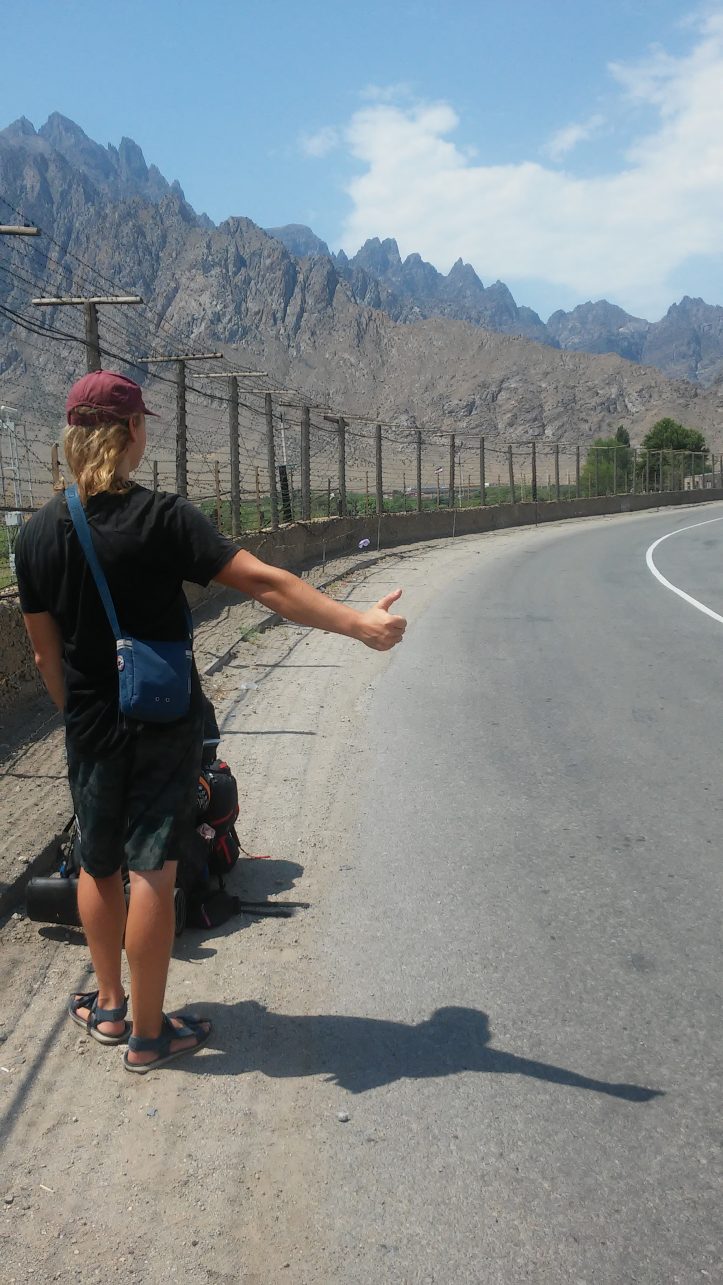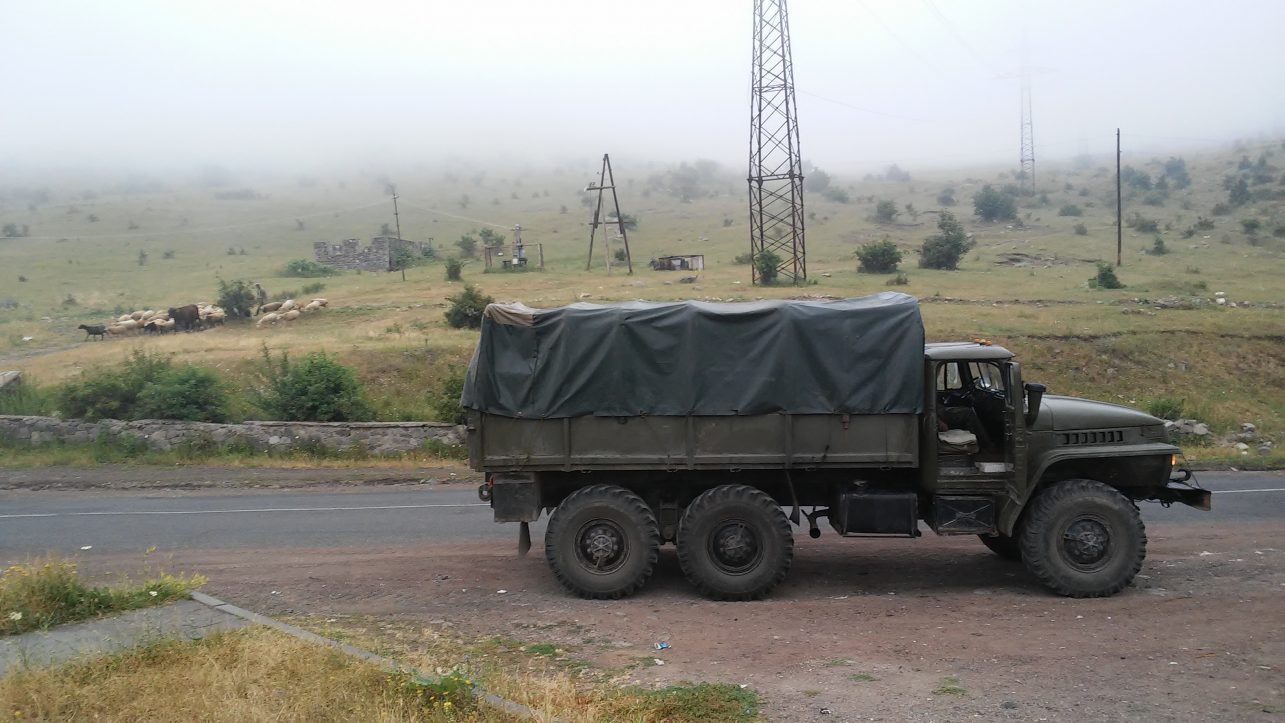I often travel from the capital to Kaunas,
Although I can get tickets without any trouble,
I do prefer hitchhiking.
Vytautas Babravičius, “Autostrada Vilnius-Kaunas”

After the summer is over, we all want to discuss where we were and what we saw: some of us in villages, others in the big Italian cities. Wherever you’ve been, I’m sure you’ve only talked about your destination and never even thought to mention how you traveled. Did you go by car, train, or bus, or were you looking at the snow-white clouds from an airplane window? Or maybe you accidentally struck up a conversation with a stranger while being transported to your destination?
Even these days you meet adventure seekers, who choose to hitch-hike. What hidden stories surround the culture of hitchhiking? Can you hear that engine rumble yet? We talked to Edvardas, a man, who used to hitch-hike back in the Soviet times, and compared his experience with the modern hitch-hiking culture in Kaunas.
What was your first hitchhiking experience?
When I was in ninth grade, my teacher took us on a field trip.
Why did you hitchhike?
The hike was both on foot and by hitching a ride. We went with backpacks and tents. There were maybe twenty people in the group, and in those days, back in the Soviet times, you couldn’t usually order a bus, chartered buses were only available in pioneer camps. So, we leave, for example, from Kaunas and agree to meet, for example, near Panevėžys. We were divided into groups of three or two. You go out on the highway and start hitchhiking. A car stops, and you ask to be driven without money. Most of the time people did just that, they were friendly and benevolent, no one was afraid to hitch-hike in those days.
And have you hitchhiked outside of school?
Yes, when I was a university student.
Where would you travel?
For example, I used to go to Karmėlava, and sometimes to the village. Buses were expensive and inconvenient, they rarely ran, and when they did, they were overcrowded. In the past, people hitchhiked because other means of transportation were not so convenient and costly, so many people had only two choices: to walk or to hitchhike. And it was necessary to travel everywhere: to Vilnius, Panevėžys, Karmėlava, and sometimes even to another country, so many people chose hitchhiking.
Have you ever picked up a hitchhiker yourself?
Yes. After all, other people picked me up and helped me out, so I was used to that. If I am driving alone, it is much more fun to pick up a hitchhiker to talk to and get to know them.
What has been your most memorable hitchhiking experience?
The most memorable one was probably with an ambulance that picked us tourists up. There was a crew of two, they had just completed a call and were heading somewere. Maybe they were traveling from Kaunas to Jonava or something like that. And another very memorable time was when my wife and I went to Russia. My brother served in Yaroslavl, so we travelled there by train. We arrived at the town, but his unit was still six kilometres away. We realized that we wouldn’t be able to walk there because we didn’t know the place and it was also cold, maybe –20 °C, so an officer took us there.

What would you talk about with those people?
About what work they do, where they are going, for what purpose, and what they do in life. When hitchhiking, you never know who will pick you up. You won’t necessarily be riding in a standard car, you can be picked up by an ambulance, an officer, a trailer truck, or even a garbage truck. This mode of transport is probably preferred by extroverts, as you can meet new people and make lifelong memories.
Do you have any tips on how to get noticed while hitchhiking?
First of all, you must not stand on the highway but before it, somewhere just outside the city, where cars start to accelerate. Second, you should not hitchhike in large groups, the drivers prefer one or two people. When traveling further or abroad, it is convenient to put up a poster that says where you are going.
A lot of people think that you need to dress up in bright colours to be seen but in reality, the person transporting you probably won’t even notice what you’re wearing. The most important thing is to not stand in a high-speed zone where braking can cause an accident.
Did you get to your destination faster when hitchhiking?
Unequivocally, 100 percent. You raise your arm and ask if they will take you to Kėdainiai. If not then you raise your arm again, “Will you take me to Kėdainiai?” No. And after the fifth time, “Yes, I am going in that direction.” Otherwise, you would have to go to the bus station, that would take time and now… 100 percent faster. Cheaper and faster.
What do you think has made hitchhiking less popular?
Three factors. First, people began to live better and started having more cars; second, unfortunate events, when it became dangerous to hitch-hike because people started disappearing, they would be taken to forests, where they were raped and even killed. That information scared a lot of people. And the third factor is that there are more opportunities now to travel by train and bus. People even arrange trips on the internet. No one stands on the roadsides anymore; you don’t see people hitchhiking, they arrange rides over Facebook or Instagram: I am going to Vilnius, can someone give me a lift? A silent hitchhiking is happening. It might even be safer that way, you know who is taking you. The emergence of social networks has had a huge impact on the hitchhiking culture. First of all, they spread terrible stories about accidents and dangerous drivers. After reading this, people immediately reject this way of travel, preferring instead to travel by train, bus, or Bolt.
Hitchhiking is not for everyone. It is not the most perfect form of travel, but if you are not alone and know how to behave to travel more safely, your trip can become the most interesting one you have ever had in your life. Although the hitchhiking culture has changed a lot in recent years, it still lives on.
We have the best highway,
Cars are flying, rolling, driving.
And I badly need to get to Kaunas.




